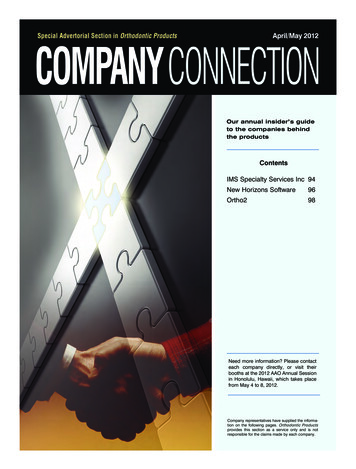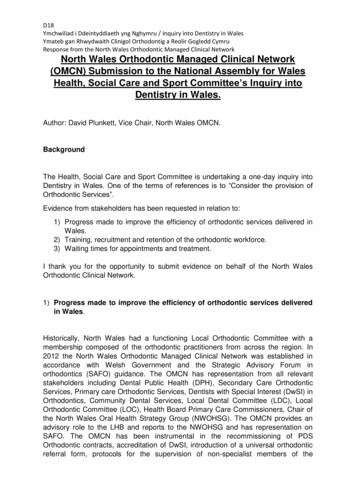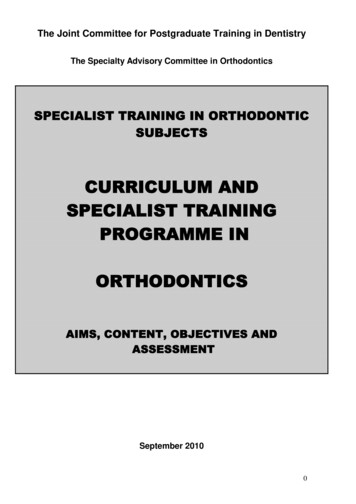
Transcription
Orthodontic SpecialtyTraining in the UKThis document has been produced by the British Orthodontic Society
Orthodontic Specialty Training in the UKSpecialty Training Registrar in OrthodonticsThere are a number of Orthodontic Specialty Training Registrar(StR) posts throughout the UK. If you are a UK/EU applicant, entryis competitive to these salaried posts and once accepted, you areallocated a unique National Training Number (NTN). StRs are paidmonthly at the rates outlined in the national terms and conditions ofservice for hospital medical and dental staff and doctors in PublicHealth Medicine and the Community Health Service (England andWales). Essential criteria for application include holding of a dentaldegree registered with the GDC and completion of a period of dentalfoundation/vocational training or the general professional training (GPT)scheme demonstrating experience in a range of dental specialties. Itis advisable for applicants to hold a postgraduate qualification (MFDS/MJDF/MFD), as is undertaking audit, presentations and publications.The training programme is monitored by the Postgraduate Deaneriesand the Specialist Advisory Committee (SAC).What does the programme entail?The full-time programme is 3 years long and involves undertaking auniversity postgraduate degree: the degree can be at the Masters(MSc, MClinDent, MPhil) or Doctorate (DDS) level. The trainingprogramme is also open to those who may, from the outset orsubsequently, want to train flexibly or job share: in this instance,Deanery approval must be given prior to interview and is dependenton the availability of such a training post. Training takes place withinhospital departments linked to recognised university dental schools andis assessed through the Annual Review of Competence Progression(ARCP) over the three years. Upon successful completion of theprogramme, the StR is eligible to sit the Membership in Orthodontics(MOrth) examination of the Royal College of Surgeons (RCS). Althoughsome universities offer a 2 year M-level programme, it does not give
eligibility to sit the MOrth examination. The MOrth and Certificate ofCompletion of Specialist Training (CCST) allow for orthodontic specialistregistration with the General Dental Council (GDC).For non-EU trainees trained in the UK and who are successful in theMOrth examination, there is no automatic entitlement to specialistrecognition. For registration to take place, non-EU trainees willhave to apply for entry to the GDC orthodontic specialist list throughequivalence demonstrating that the training undertaken is very similarto UK/EU trainees. There is no guarantee of acceptance onto thespecialist list via this route.What are the costs?The trainee is required to pay academic fees to the university andthese fees, comprising of bench and course fees, will vary betweenuniversities and between UK/EU and non-EU trainees. They are alsosubject to change, therefore, it is best to check with the individualschools when applying. There will also be additional costs during thetraining period, such as the purchase of computer and photographyequipment, travel costs, printing and photocopying.As an orthodontic specialist, where can I work?As an orthodontic specialist, you can provide orthodontic care withinthe primary care setting (specialist or general practice and within theCommunity Service). If you want to work in the hospital orthodonticservice as a consultant, you will be required to undertake a further2 years of higher training as a Post-CCST trainee; training includesthe management of more complex interdisciplinary orthodontic casesand experience of hospital management. To become an academicconsultant based within the university, there is also the requirement toundertake research towards the award of a PhD.How do I apply?Deanery approved posts are affiliated to the following universities andtheir associated dental schools and hospitals: Belfast, Birmingham,
Bristol, Cardiff, Dundee, Edinburgh, Glasgow, King’s College London,Leeds, Liverpool, Manchester, Newcastle, Queen Mary (Universityof London), Sheffield, UCL Eastman Dental Institute. The posts areadvertised either annually or every three years in the British DentalJournal, and the exact number of posts can vary. It is imperative thatyou investigate the courses on offer, because they will all have theiradvantages and limitations.COPDEND and the London Deanery together co-ordinate NationalRecruitment for Orthodontics StR training posts in England, Wales andScotland. Application is online via the London Deanery website andthere are a number of online documents available that give specificand detailed information on the application process and personspecification. In addition, there are links to the individual programmes.The interviews are usually held in May during which the shortlistedapplicants are ranked. Thereafter, applicants are allowed to visit thedifferent programmes or attend an open day for more information. Theopportunity to visit enables applicants to decide on their preferences,which need to be registered in early July. Dependent on the MOrthresults and consequently the number of free posts available, successfulapplicants will be given a single offer for their highest availablepreference in early July and have 48 hours to accept or reject the offer.In April 2012, the UK Border Agency closed the Tier 1 immigration route,which has been used by non-EU doctors who have graduated from aUK dental school and have completed their Foundation Programme.For further information on eligibility for specialty training for non-EUapplicants, the relevant deanery should be contacted. Those applyingfor overseas posts are required to apply through the individualuniversities.
Where can I find out more?The following sources provide useful information if you are consideringspecialisation in the field of orthodontics: www.dh.gov.uk www.gdc-uk.org www.bda.org t-training/higher-specialist-training http://www.mjdf.org.uk/ (Royal College of Surgeons England) http://www.rcsed.ac.uk (Royal College of Surgeons Edinburgh) http://www.rcpsg.ac.uk/Examinations/Dental/ (Royal College ofPhysicians and Surgeons Glasgow) http://www.rcsi.ie (Royal College of Surgeons Ireland) http://www.copdend.org/content.aspx?Group foundation&Page foundation specialty%20training nt The Training Grades Group of the British Orthodontic Societyorganise an annual study day for those qualified dentists consideringspecialisation in the field of orthodontics. The individual programme webpagesDentists with Special Interest in OrthodonticsWhat is a Dentist with Special Interest in Orthodontics?A DwSI in Orthodontics is essentially a primary care dentist whohas a special interest in the field of orthodontics, but is not aspecialist. They will have gained additional experience and training inorthodontics. DwSIs in Orthodontics can be formally recognised by thecommissioners of orthodontic care, however, they are not eligible forspecialist list registration with the General Dental Council.Is there a need for DwSIs in Orthodontics?There is a need in certain geographical areas where there is a shortageof orthodontic specialists. In these areas, some primary care dentistsare providing the bulk of orthodontic treatment and there is a need forthis to be managed and recognised appropriately.
What is the role of the DwSI in Orthodontics within the clinicalnetwork?The DwSI in Orthodontics is expected to treat patients within theircompetence and refer complex cases not within their competence toa specialist orthodontist or local hospital service as part of the locallymanaged clinical network. The orthodontic clinical network is defined asa group of orthodontic practitioners, including orthodontic consultants,specialist orthodontic practitioners, and DwSIs and GDPs, who provideorthodontic care. The balance will depend on the workforce availablein different geographical areas. The network will ensure that needs aremet, the service is developed appropriately and that high standards andoutcomes of care are maintained at all times.The DwSI in Orthodontics would be expected to demonstrate an ongoingcommitment to ensuring that an agreed minimum level of competency inorthodontics is maintained. Furthermore, the standard of care providedshould be equivalent to that expected of orthodontic specialists in apractice that has the additional facilities and equipment for the provisionof orthodontic treatment. The DwSI in Orthodontics would be expected toundertake continuing professional development (CPD) and education intheir special area of interest and core generalist areas.The following are sources of evidence of ongoing commitment by theDwSI in Orthodontics: Peer review, such as mentoring arrangements Verifiable relevant CPD and attendance at orthodontic courses Be a member of the appropriate orthodontic study groups and societies Satisfactory completion of cases as indicated by PAR outcomes Participate in structured training as part of the local orthodonticclinical networkHow can I be recognised as a DwSI in Orthodontics?The DwSI in Orthodontics needs to provide evidence of generalistprimary dental care competencies. The presentation of a portfolioshould provide evidence of training and experience in generalist skills,
including areas such as infection control, radiography and medicalemergencies. The MFGDP (UK) examination run by the FGDP (UK)covers a number of topics in the form of modules; the Key Skillsassessment provides a portfolio approach to the validation of generalfitness to practise.Evidence of the required orthodontic competencies may be providedin the form of formal qualifications, or for some applicants, otherexperience-based evidence may be acceptable as judged by a localaccreditation panel. The Diploma in Primary Care Orthodontics (DPCO)is a three-year part-time course leading to the DPCO (RCS) exam. Thecourse is led by the British Orthodontic Society and FGDP (UK). It isnot a specialist orthodontic programme and does not lead to the MOrth.Dentists registered in EU countries and who apply for DwSI positionsneed to demonstrate the competencies through equivalence.In summary, the DwSI in Orthodontics will be expected to demonstratethe following: Understand occlusion and its development Know how to diagnose and recognise malocclusion and when to interveneKnow when to refer or provide treatment within their level of competencyUnderstand the limitations of appliance therapy and demonstrate theappropriate clinical skillsWhere can I find out more? The ‘Guidelines for the Appointment of Dentists with SpecialInterest (DwSI) in Orthodontics’ is a framework documentdeveloped by the Department of Heatlh and the Faculty of GeneralDental Practice (FGDP, UK) and includes the level of competenciesexpected and thus the scope of treatment that may be providedby DwSIs in Orthodontics, and contract specification. This documenthas been written with input from the British Orthodontic Society andrepresentatives of the orthodontic clinical network. Other information may be found on the Department of Healthwebsite (www.dh.gov.uk) and the FGDP (UK) website (www.fgdp.org.uk).
Revised April 2013British Orthodontic Society12 Bridewell Place London EC4V 6APEmail: ann.wright@bos.org.uk www.bos.org.uk Telephone: 020 7353 8680 Fax: 020 7353 8682Registered Charity No: 1073464
the primary care setting (specialist or general practice and within the Community Service). If you want to work in the hospital orthodontic service as a consultant, you will be required to undertake a further 2 years of higher training as a Post-CCST trainee; training includes the management of more complex interdisciplinary orthodontic cases










